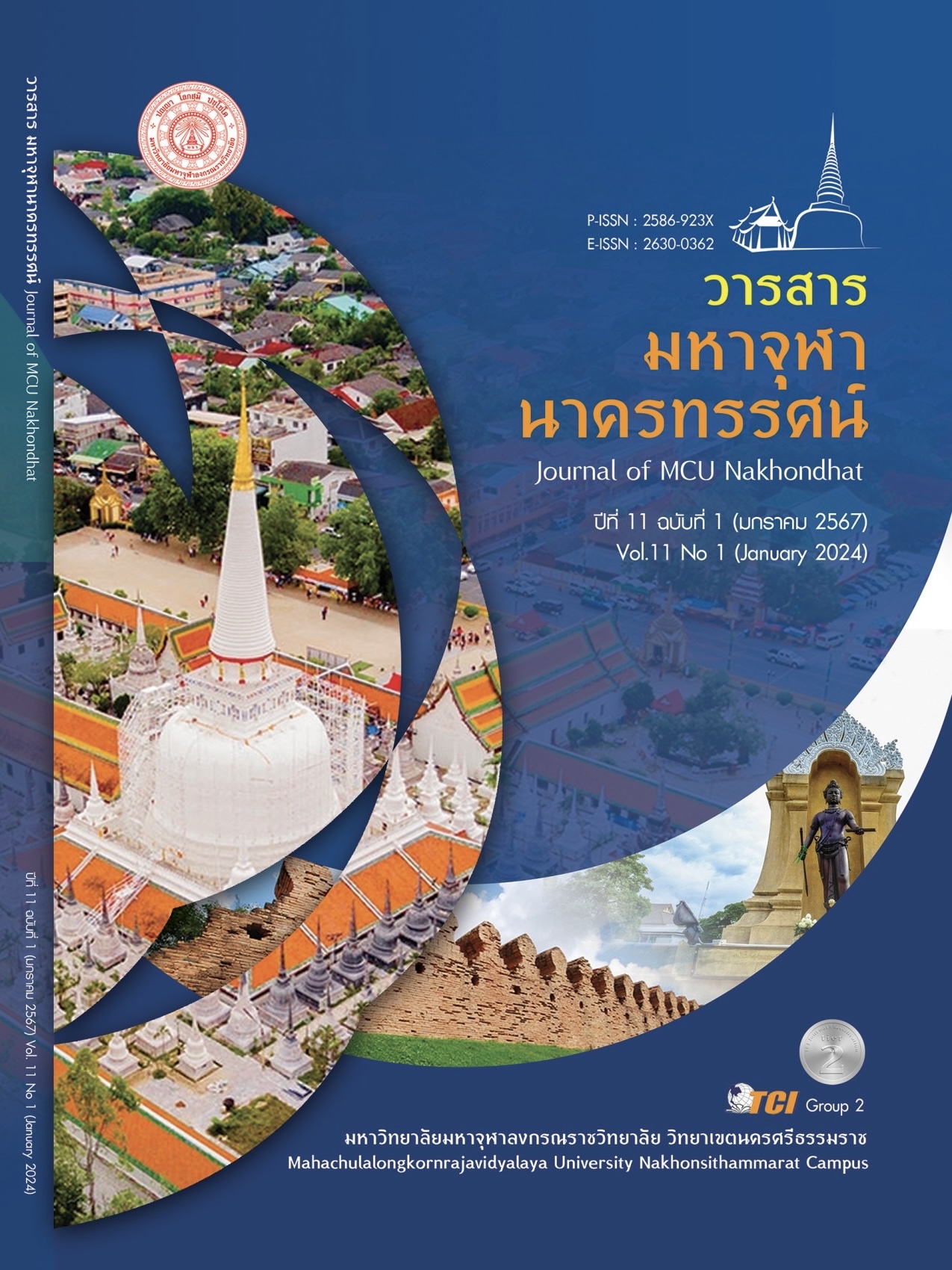ADMINISTRATOR ROLES IN CREATING ORGANIZATIONAL CULTURE UNDER CHANGES IN 21st CENTURY
Main Article Content
Abstract
The purpose of this article is to present the roles of administrators in creating an organizational culture under rapid change in the 21st century. Rapid academic changes, advanced information technology, and rising competitions have challenged administrators in order to lead the organization to success in keeping with its objectives. As a result, the organization must be changed by administrators adopting new strategies for managing it. The organizational culture is a vital supporting factor that is mutually accepted by members of the organization, additionally, it is also a code of conduct and procedures that everyone in the organization must accept and implement. For this reason, the important thing that administrators need to consider first when it comes to changing their organization is organizational culture. The image of a united organization is enhanced by a good organizational culture, which is essential for every successful organization to achieve success. Administrators hold key roles in driving organizational culture to lead the organization during an era of change. Hence, administrators have the ability to create an organizational culture through their roles as follows: 1) Adjusting the mindset of people within the organization 2) Establishing a clear direction for the organization 3) Promoting an organizational culture that emphasizes teamwork 4) Sharing information and communicating 5) Facilitating and providing assistance 6) Creating an organizational culture that prioritizes learning and adaptability 7) Developing of technology that focuses on information and communication 8) Initiating a collaborative network, and 9) Creating or developing a system that promotes morale. Therefore, administrators who have created a good organizational culture will be able to drive their management and be prepared to handle any changes that may come up to achieve the organization's objectives.
Article Details

This work is licensed under a Creative Commons Attribution-NonCommercial-NoDerivatives 4.0 International License.
References
กิ่งกมล เกลี้ยงแก้ว. (2562). วัฒนธรรมองค์กรที่ส่งผลต่อการบริหารงบประมาณของโรงเรียนสังกัดสำนักงานเขตพื้นที่การศึกษา มัธยมศึกษาเขต 11 ในจังหวัดสุราษฎร์ธานี. ใน วิทยานิพนธ์ครุศาสตร์มหาบัณฑิต สาขาวิชาการบริหารการศึกษา. มหาวิทยาลัยราชภัฏสุราษฎร์ธานี.
จุฑามาศ รัชนจิตบริสุทธิ์ และคณะ. (2566). การพัฒนาวัฒนธรรมองค์กรในยุคดิจิทัลตามหลักสังคหวัตถุ 4 โรงเรียนประถมศึกษา อำเภอพระนครศรีอยุธยา จังหวัดพระนครศรีอยุธยา. วารสารครุศาสตร์ปริทรรศน์ฯ, 10(2), 383-393.
ณัฐฐินันท์ โยมงาม และอุไร สุทธิแย้ม. (2565). บทบาทการสร้างวัฒนธรรมองค์กรของผู้บริหารสถานศึกษา ตามการรับรู้ของครู กลุ่มโรงเรียนสหวิทยาเขตเบญจบูรพา สำนักงานเขตพื้นที่การศึกษา มัธยมศึกษากรุงเทพมหานคร. Journal of Roi kaensarn Academi, 7(10), 364-376.
นิทัสน์ มาสาลี และคณะ. (2565). แนวทางการพัฒนากรอบความคิดเติบโตของผู้บริหารสถานศึกษา. วารสารวิทยาลัยบัณฑิตเอเชีย, 12(3),199-204.
เบญจพร สุคนธร. (2565). บทบาทของผู้บริหารสถานศึกษาในการส่งเสริมการจัดการเรียนการสอนออนไลน์ สังกัดสำนักงานเขตพื้นที่การศึกษามัธยมศึกษา กรุงเทพมหานคร เขต 2. ใน วิทยานิพนธ์ปริญญา การศึกษามหาบัณฑิต สาขาการบริหารการศึกษา. มหาวิทยาลัยเกริก.
ไว ซีรัมย์ และคณะ. (2563). วัฒนธรรมองค์กรที่เสริมสร้างการจัดการที่ดีของระบบบริหารราชการไทย. วารสารวิชาการ มจร บุรีรัมย์, 5(2), 176-192.
ศิริรักษ์ บุญพร้อมรักษา. (2561). ทัศนะและบทบาทผู้นำที่แท้จริงกับการบริหารองค์การแห่งศตวรรษที่ 21. วารสารเกษตรศาสตร์ธุรกิจประยุกต์, 12(17), 39-54.
ศุภวรรณ คงเสมา และคณะ. (2565). วัฒนธรรมองค์กร : เงื่อนไขสำคัญของการสร้างความได้เปรียบในการแข่งขัน. วารสารวิชาการร้อยแก่นสาร, 7(12), 378-390.
สุกัญญา ล่ำสัน. (2565). วัฒนธรรมองค์กรที่มีผลต่อประสิทธิผลการบริหารงานโรงเรียน สังกัดสำนักงานเขตพื้นที่การศึกษามัธยมศึกษานครพนม. ใน วิทยานิพนธ์ปริญญาครุศาสตรมหาบัณฑิต สาขาวิชาการบริหารการศึกษา. มหาวิทยาลัยราชภัฏสกลนคร.
อุดรรัตน์ ธรรมดา. (2565). การสร้างวัฒนธรรมองค์กร (Organization Culture). เรียกใช้เมื่อ 10 มกราคม 2567 จาก https://blog.wu.ac.th/?p=5702
Brent Gleeson. (2019). 7 Mindsets Necessary for Successful Leadership Development. Retrieved October 14, 2023, from http://www.forbes.com/site/brentgleeson/2018/05/31/7-mindsets-necessary-for-successful-leadership-development
Gill, R. (2007). Theory and practice of leadership. New Delhi: Sage.


